- The main difference between NordVPN and PureVPN is that NordVPN is faster, with more security features and a larger server network.
- NordVPN is more reliable for unblocking streaming services and letting you stream without lag.
- PureVPN is cheaper and is good for Linux users because it offers an easy-to-use Linux graphical user interface (GUI) app.
Facts & Expert Analysis About PureVPN vs NordVPN
- NordVPN’s Nordic inspiration: NordVPN claims to be inspired by the Nordic ideals of confidence, trust and innovation. NordVPN focuses on security and privacy features that help users browse the internet freely.
- PureVPN’s logging policy and the FBI: PureVPN’s logs helped the FBI catch Ryan S. Lin, a cyberstalker. This move revealed that PureVPN was collecting identifiable user logs even though it claimed not to. Its history of audits is equally sketchy, and it’s unclear who owns the company.1
- Older is not necessarily better: PureVPN was launched in 2006; NordVPN didn’t emerge on the scene until six years later, in 2012. Though PureVPN has been around for longer, NordVPN is more innovative and boasts more security and privacy features.
If NordVPN and PureVPN have landed on your VPN search list, it’s no surprise — they’re two popular VPNs, though only NordVPN makes our best VPN list. NordVPN is a well-rounded VPN with excellent privacy and security features. PureVPN is an older VPN with cheap pricing. In this NordVPN vs PureVPN matchup, you’ll discover which is best for you.
We tested the VPNs and can confirm that NordVPN is a better choice for many use cases, including streaming, security and privacy. PureVPN’s competitive advantage is its cheaper pricing, but NordVPN still offers better value for the money. Keep reading to see how the VPNs fare against each other across multiple categories.
Show allLearn more about our editorial team and our research process.
-
11/14/2024
Article rewritten to focus on aspects instead of general categories. Answered some additional questions and provided more recommendations.
-
06/05/2024 Facts checked
We rewrote this comparison and restructured the article with more informative sections, focusing on which VPN is best for different use cases.
- updates
- 1
- : PayPal, Credit card, Google Pay, AmazonPay, ACH Transfer, Cash
- : 6
- :
- :
- :
- :
Average speedDownload Speed91 MbpsUpload Speed9 MbpsLatency4 ms - 2
- : PayPal, Credit card
- : 10
- :
- :
- :
- :
Our VPN experts agree that NordVPN is better than PureVPN for many use cases. Over the years, NordVPN has reliably unblocked streaming services like Netflix without lag. It’s also one of our preferred choices for browsing safely and anonymously online, even on public WiFi. NordVPN suffered a third-party server breach in 2018, but it handled it well. Read on for more details.
Which Is Better: NordVPN vs PureVPN?
NordVPN works better for more use cases than PureVPN. Its large server network gives you more options when choosing an IP address. NordVPN is excellent for unblocking streaming platforms. It also boasts vital security features like double VPN and threat protection. You can learn more in our full NordVPN review.
PureVPN is more affordable than NordVPN on short-term and long-term plans. However, when you consider the features and performance NordVPN offers, it’s worth every penny. PureVPN has a longer money-back guarantee, but you might not actually get your money back. Our PureVPN review goes into more detail.
Who Is NordVPN For?
- People who want a VPN for streaming: NordVPN’s fast speeds and reliable unblocking ability make it the best option for streaming shows or watching live sports.
- People who want a secure VPN: NordVPN’s security and privacy features ensure that users browse safely and anonymously.
- People working remotely: NordVPN has a large server network, dedicated IP servers and Meshnet, which can help remote workers access networks and collaborate.
Who Is PureVPN For?
- People who want an affordable VPN: PureVPN has a cheap monthly plan and offers significant discounts on long-term plans.
- People who want a VPN for Linux: PureVPN has a Linux GUI app.
Our Detailed Comparison Methodology
We compared NordVPN and PureVPN, considering their key features, cost, as well as security features, privacy features, streaming performance, speed, server list and usability. We then evaluated what elements the two VPNs have in common, and what sets them apart. In all cases, we tested the features to see whether they perform as well as the VPN providers claim.
PureVPN vs NordVPN: Comparison at a Glance
| Review | Review | |
| Payment methods | PayPal, Credit card, Google Pay, AmazonPay, ACH Transfer, Cash | PayPal, Credit card |
| Accepts cryptocurrency | ||
| Simultaneous connections | 6 | 10 |
| Supports split tunneling | ||
| Unlimited bandwidth | ||
| Free trial available | 7 days on mobile | |
| Refund period | ||
| Worldwide server amount | 5,800 servers in 60 countries | 6,500 servers in 65 countries |
| Desktop OSes | Windows, MacOS, Linux | Windows, MacOS, Linux |
| Mobile OSes | Android, iOS | Android, iOS |
| Browser extensions | Chrome, Firefox, Edge | Chrome, Firefox, Edge |
| Can be installed on routers | ||
| Can access Netflix US | ||
| Can access BBC iPlayer | ||
| Can access Hulu | ||
| Can access Amazon Prime Video | ||
| Encryption types | 256-AES, ChaCha20 | 256-AES |
| VPN protocols available | OpenVPN, IKEv2, NordLynx | OpenVPN, IKEv2 |
| Enabled at device startup | ||
| Allows torrenting | ||
| No-logging policy | ||
| Passed DNS leak test | ||
| Killswitch available | ||
| Malware/ad blocker included | ||
| Live Chat | 24/7 | 24/7 |
| Email support | 24/7 | 24/7 |
| Phone support | ||
| User forum | ||
| Knowledgebase |
NordVPN Key Features
- Large server network: NordVPN has more than 6,000 servers in 111 countries.
- Fast speeds: NordVPN is a very fast VPN, with excellent download speeds, upload speeds and latency.
- Robust security features: NordVPN has many basic and advanced security features, including AES encryption, a kill switch for DNS leak protection, double VPN, dedicated servers for various tasks and a malware blocker.
- Reliable unblocking ability: NordVPN can unblock all the major streaming services, from Netflix to BBC iPlayer.
- Money-back guarantee: NordVPN’s reliable 30-day refund window could allow you to test the service for a free month.
PureVPN Key Features
- Large server network: PureVPN has more than 6,000 servers in more than 65 countries.
- Money-back guarantee: PureVPN offers a 31-day refund period, but it’s unreliable.
- Useful security features: PureVPN has vital online security features, including a kill switch, dedicated IPs and obfuscation.
- Decent streaming ability: PureVPN can unblock all the major streaming services, though you might experience lag.
- Affordable pricing: PureVPN’s monthly, yearly and two-year plans are affordable compared to manh other VPNs.
NordVPN vs PureVPN Cost
In terms of pricing, PureVPN is more affordable than NordVPN. However, NordVPN is a more reliable VPN service, and its trove of features and better performance make it a better value for the money.
Both NordVPN and PureVPN offer monthly, yearly and two-year plans.
Both NordVPN and PureVPN let you use one subscription on up to 10 devices. That should be enough to cover a household with multiple devices, including phones, laptops and a workstation.
PureVPN offers extra device licenses (“multi-logins”). For an extra $1.04 per month, you can get 10 more simultaneous connections. However, this is an unnecessary expense. If you want to protect more devices, simply connect your VPN to a router and all connected devices will automatically be protected.
NordVPN vs PureVPN: Similarities
Below, you’ll discover key areas where NordVPN and PureVPN offer the same or similar features: encryption and protocols, a kill switch, device compatibility, parent companies, dedicated IPs, obfuscation and split tunneling. Expand each section to dig into each one.
Encryption and ProtocolsNordVPN and PureVPN protect your traffic using AES-256 encryption, one of the strongest encryptions available. It would take a hacker millions of years to crack it. These VPNs pair AES encryption with OpenVPN and IKEv2 protocols. Both VPNs will choose your protocol by default, but you can switch to OpenVPN if you want a good combination of speed and security.
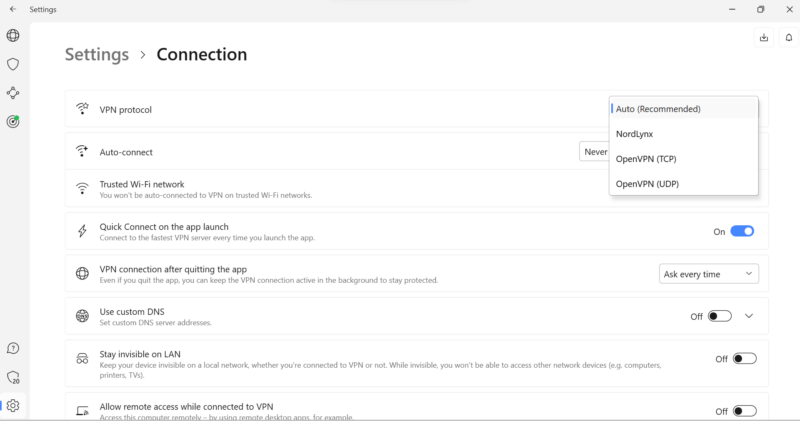
and OpenVPN (TCP/UDP).
IKEv2 is best for mobile devices because it offers stable connections when networks fluctuate. PureVPN offers the fast WireGuard protocol paired with the equally robust ChaCha20 encryption. NordVPN has a proprietary VPN protocol, NordLynx, which is built on WireGuard. These VPN protocols work well for streaming, gaming and other bandwidth-hungry activities.
NordVPN and PureVPN offer a kill switch, which disables your internet connection when your VPN accidentally disconnects. That way, your IP address won’t leak if your VPN falters, whether due to an unstable internet connection or server failure.
NordVPN and PureVPN offer system-wide kill switches, which cut off your entire device from the internet unless you have an active VPN connection.
In addition, NordVPN offers an app-level kill switch, which lets you set up the kill switch for specific apps. For example, you can protect your torrenting client with the kill switch while browsing the internet like normal without interruptions.
You can use both PureVPN and NordVPN on phones, laptops, tablets and routers — they have apps for all the major operating systems. Both VPN services are compatible with Windows, Android, iOS and macOS devices. NordVPN is high on our lists of the best VPN for iPhone and the best VPN for Samsung.
Linux users can set up NordVPN and PureVPN using the command-line interface on their Linux distro. The setup instructions are on the VPNs’ support pages. However, PureVPN is better for Linux because it offers a graphical user interface (GUI).
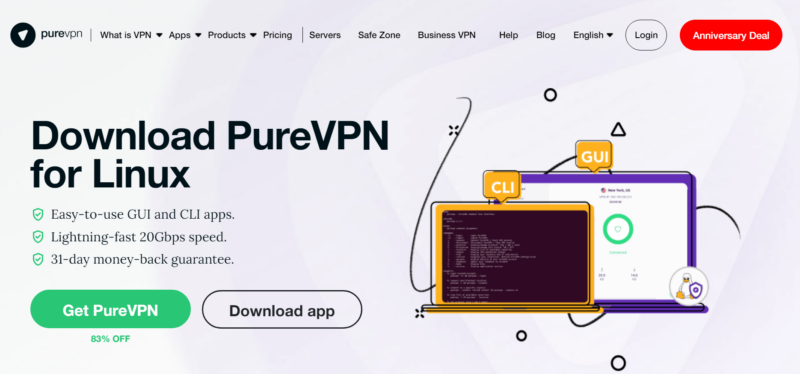
NordVPN and PureVPN also have browser extensions for Chrome, Firefox and Edge.
NordVPN and PureVPN work well with many streaming devices and TVs, including Android TVs, Samsung TVs and Fire Stick. Both services also support Apple TV’s native tvOS17 app, making them excellent picks for streaming on Apple TV HD and 4K.
If PureVPN and NordVPN don’t have a native client for your device, connect the VPN and the device to your router. A router VPN will protect any device connected to the router. Both VPNs work with many router models and firmware, including DD-WRT, Linksys, Asus and Tomato.
NordVPN and PureVPN allow you to watch all the major streaming services. During our tests, both services unblocked Netflix, Amazon Prime Video and BBC iPlayer. We were able to watch different Netflix libraries, including the American, British, Canadian, French and Japanese libraries.
The table below lists the streaming platforms these VPNs can unblock.
We experienced a few lags while streaming Netflix with PureVPN but didn’t experience any such issues while streaming with NordVPN.
PureVPN and NordVPN offer dedicated IP addresses, which are unique IPs that can help you avoid CAPTCHAs and blocklists. Note that dedicated IPs are not part of your VPN subscription; they come at an extra cost — sometimes more than the cost of the VPN itself.
PureVPN’s dedicated IP costs $4.45 per month. NordVPN’s is slightly cheaper, at $3.69 per month.
- NordVPN dedicated IP locations: the U.S., the U.K., the Netherlands, Canada, Germany, Australia, Hong Kong, France, Italy, Spain, Belgium, Denmark and Austria.
- PureVPN dedicated IP locations: the U.S., the U.K., the Netherlands, Canada, Germany, Australia and Hong Kong.
PureVPN and NordVPN offer obfuscation, which can help you evade VPN-blocking firewalls and censorship in restrictive regimes. Obfuscation makes your VPN traffic seem like regular traffic, so prying eyes won’t know you’re using a VPN.
PureVPN supports obfuscation that’s automatically activated when you select the OpenVPN protocol.
NordVPN has servers designated for obfuscation. These specialized servers are optimized to disguise your VPN traffic. NordVPN’s obfuscated servers are in Canada, France, Germany, Hong Kong, Italy and the Netherlands.
NordVPN and PureVPN both allow split tunneling on the Android apps, as well as on Android TV and Windows devices. This feature lets you route one part of your internet traffic through a VPN tunnel while the other goes directly to the internet. Letting all your internet traffic run through a VPN can slow down your internet connection.
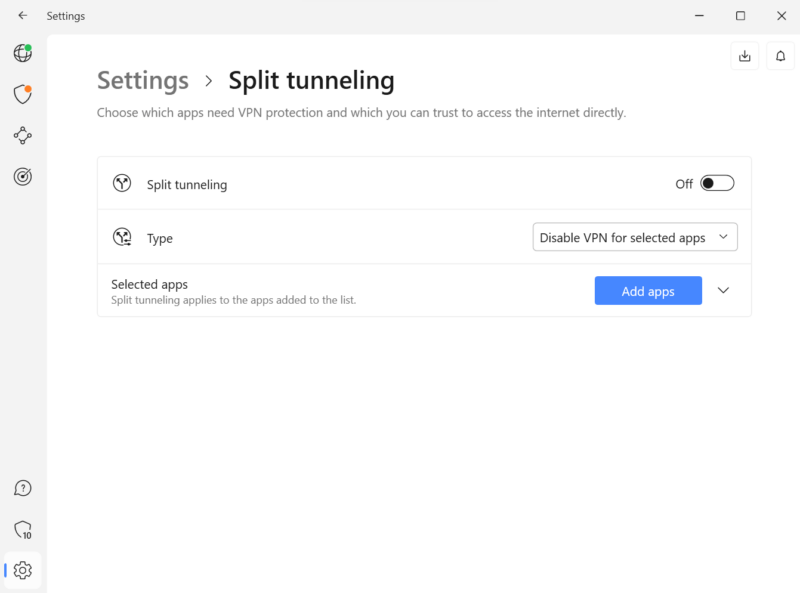
and which ones don’t.
NordVPN and PureVPN support app-level split tunneling, which means you can exclude or include specific apps in your VPN tunnel. Other VPNs, such as Surfshark, support URL/IP address-based split tunneling, but neither NordVPN nor PureVPN operates this way.
PureVPN vs NordVPN: Differences
In this section, we’ll reveal the differences between PureVPN and NordVPN category by category. To give you a sneak peak, PureVPN and NordVPN differ in terms of cost, speeds, money-back guarantee, server list, double VPN, file sharing, logging policies and customer support.
Money-Back GuaranteeNordVPN offers a 30-day money-back guarantee, while PureVPN offers 31 days. A money-back guarantee is a must-have; it allows you to use the VPN and cancel without losing your money if you’re not satisfied. NordVPN easily earns a spot on our roundup of the best VPN free trials.
We are hesitant about recommending PureVPN’s money-back guarantee. Some of our VPN experts have reported difficulties getting a refund despite having canceled within 31 days. Our experts are not alone: On Reddit, many former PureVPN users have slammed it for not honoring its money-back guarantee.
In contrast, NordVPN fulfills its money-back guarantee if you request it within the 30-day refund window. We’ve tested it multiple times over the years and have always gotten our money back a few days after the request.
You’ll enjoy faster speeds when browsing with NordVPN compared to PureVPN. All VPNs will reduce your speeds, but the fastest ones have a negligible impact. If you look through our VPN comparison charts, you’ll notice that NordVPN is one of the fastest VPNs on the market.
NordVPN maintained at least 90% of our initial download speeds in nearby and faraway locations. However, PureVPN only kept 73% of our initial download speeds in the closest location, and speeds fluctuated in distant locations. NordVPN’s better download speeds make it ideal for streaming, downloading large files, browsing social media and taking video calls.
| Unprotected (Oregon, USA) | 137 Mbps (100%) | 127 Mbps (100%) | 07 ms (100%) |
| (Los Angeles, USA) | 100 Mbps (73%) | 82 Mbps (65%) | 45 ms (643%) |
In terms of upload speeds, PureVPN was hit-or-miss. It lost over 30% of our initial upload speeds in some locations. NordVPN performed more consistently, keeping 90% of our initial upload speeds. We recommend NordVPN for activities that require good upload speeds, such as video calls, live streaming and uploading files to cloud storage.
Our tests also showed that NordVPN has lower latency compared to PureVPN. NordVPN’s worldwide latency was 145 ms, while PureVPN’s average latency was over 300 ms. This suggests that NordVPN is better suited for fast online gaming. The lower your latency, the lower the chances of experiencing lags while gaming.
NordVPN and PureVPN have similar VPN server counts: more than 6,000. However, NordVPN has a better server spread, covering 111 countries, while PureVPN has servers in only around 65 country locations.
NordVPN offers more server locations than PureVPN in regions like Europe, Asia, the Middle East and Africa. As a result, we recommend NordVPN over PureVPN if you need a VPN with a wide range of IP address options, which is perfect for vacationing or remote work while on the road.
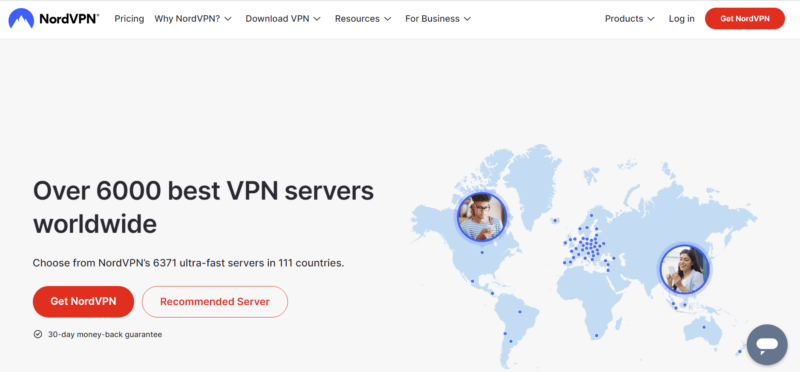
In theory, because NordVPN and PureVPN have similar server counts, it might seem like NordVPN’s wide server distribution could lead to congestion and slow servers. However, as you can see from the speed tests above, NordVPN is faster than PureVPN.
NordSecurity owns NordVPN and Surfshark — another great VPN. So far, there haven’t been any records of NordSecurity being involved in shady dealings. In addition, the multiple VPNs it owns operate independently.
PureVPN’s ownership is murky and suspicious. From our research, we can point to four companies that claim ownership of the service. PureVPN’s terms of service claim that GZ Systems Limited is the owner. However, when PureSquare was launched, Uzair Gazit stated that it would be a parent company of PureVPN.
Gaditek, a product-based company, mentions PureVPN as one of its brands, but Disrupt.com, a startup accelerator co-founded by Gazit, also claims the service. This messy tangle of ownership and lack of transparency suggests that there could be some underhand dealings.
NordVPN operates out of its headquarters in Panama, while PureVPN is headquartered in the British Virgin Islands. Both are privacy-friendly jurisdictions with no data retention laws. In addition, neither country is part of the Five, Nine or 14 Eyes Alliances, a series of data-sharing arrangements where partner countries can violate civil rights by sharing intelligence.
NordVPN offers double VPN servers, but PureVPN doesn’t. You might need double VPN servers if you’re an activist, a journalist, an informant or someone who wants to be doubly sure that governments can’t track your movements. A double VPN routes your traffic through two servers instead of one, adding an extra layer of encryption to your traffic.
NordVPN offers double VPN servers in the U.S., the U.K., Canada, France, Taiwan, Sweden, Hong Kong, the Netherlands and Switzerland.
NordVPN offers Meshnet, which lets users establish secure connections with their other devices. Through Meshnet, you can connect up to 60 devices and access them remotely, regardless of location. You can also share files and collaborate on projects, making it ideal for people who work on the road.
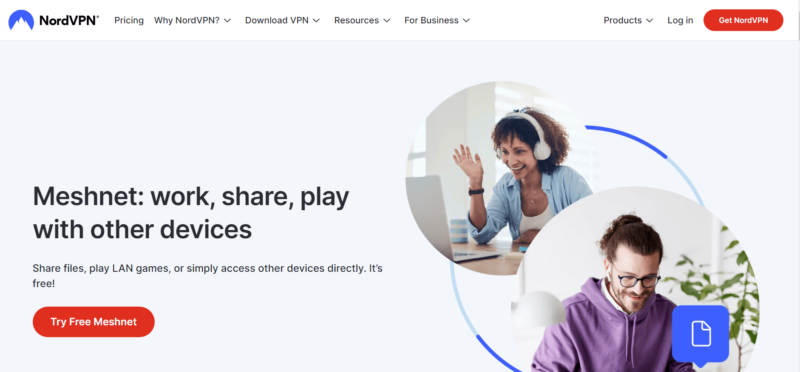
Meshnet lets you set up multiplayer games and play with people from all over the world. It also has security benefits: Connected devices can act as a VPN server, enabling you to switch your IP address. PureVPN offers no analog to Meshnet.
NordVPN and PureVPN state in their privacy policies that they don’t log information that can be traced back to you, such as your IP address, connection logs or browsing history. Both providers collect your name, email address and payment details, but these details are standard fare to render services.
PureVPN has a checkered privacy history. In 2017, the VPN service handed over a user’s details to the FBI despite claiming not to log identifiable user information. Though PureVPN revised its privacy policy to become a no-logs VPN provider, the incident has left a stain on PureVPN’s privacy credentials.
Since then, PureVPN claims to have taken steps to restore users’ confidence in its service. In our PureVPN review, we noted it claimed that Altius IT and KPMG audited and verified its logging policy.
However, our editorial team does not consider Altius to be a reputable firm (none of the clients on its list actually mention it anywhere on their own sites), and the PureVPN site no longer mentions KPMG on its website. PureVPN now claims to have an “always-on” audit, but this is not practical since audits require extensive preparation.
In contrast, NordVPN has a trustworthy audit history. PricewaterhouseCoopers first audited and verified its logging policy in 2018. NordVPN has been audited three more times over the last few years, with the latest conducted by Deloitte in 2023. Its VPN apps have been found to be safe and secure every time.
Unlike PureVPN, NordVPN runs a RAM-only server network, which erases all user data with every reboot. This adds an extra layer of privacy, ensuring that even if authorities seize NordVPN’s data or hackers break in, there’ll be nothing to see. Because of PureVPN’s shady history and NordVPN’s RAM-only servers, we consider NordVPN better for privacy.
NordVPN provides better customer support than PureVPN. First, its knowledgebase is more comprehensive, with detailed FAQs, setup guides and annotated troubleshooting guides. In addition, NordVPN has an extensive YouTube channel with more than 900 videos that can address your issue and answer your questions.
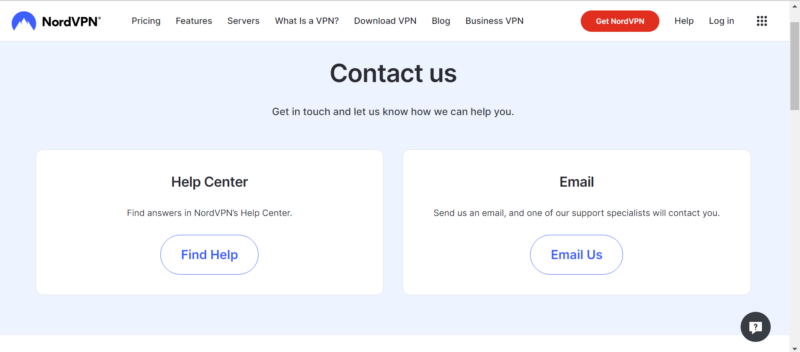
In addition, during our tests, NordVPN’s email support agents responded faster than PureVPN’s. We got a response from NordVPN within four hours of our query, whereas PureVPN’s reply came the next day. Similarly, NordVPN’s live chat agents were swift and responsive, whereas PureVPN’s agents kept us waiting for minutes.
The Verdict: Why We Think NordVPN Wins Overall
NordVPN outperforms PureVPN in most areas. It has a larger server spread, with servers in more countries than PureVPN. It’s also the faster of the two, making it the better choice for any activity that requires fast speeds, such as streaming or gaming. NordVPN users can reliably unblock all streaming services with guaranteed high-quality streams.
PureVPN is more affordable than NordVPN, though we’re confident NordVPN offers better value for the money. However, if you need a VPN for Linux, PureVPN could be the better pick since it has a GUI app for Linux distros.
Have you used NordVPN or PureVPN before? What was your experience with each of them? Which of the two are you leaning toward after reading this article? Are there any other VPNs you want us to review? Share your thoughts and suggestions in the comments section below. As always, thanks for reading.
If You Want to Consider Other Services, Check Out…
- ExpressVPN: Built-in obfuscation is available on all servers. Read our full ExpressVPN review.
- Surfshark: This VPN is more affordable than NordVPN and PureVPN and boasts advanced features like an IP rotator. Read our full Surfshark review.
- CyberGhost: User-friendly apps let you automate your VPN use. Read our full CyberGhost review.
- TunnelBear: The free plan offers access to 47 servers and 2GB of data each month. Read our full TunnelBear review.
- 1
- : PayPal, Credit card, Bitcoin, PaymentWall
- :
- :
- :
- :
- :
Average speedDownload Speed90 MbpsUpload Speed9 MbpsLatency6 ms - 2
- : PayPal, Credit card, Google Pay, Amazon Pay
- : Unlimited
- :
- :
- :
- :
Average speedDownload Speed93 MbpsUpload Speed9 MbpsLatency125 ms - 3
- : PayPal, Credit card, bitcoin, Amazon Pay
- : 7
- :
- :
- :
- :
Average speedDownload Speed79 MbpsUpload Speed9 MbpsLatency33 ms - 4
- : Credit card
- : Unlimited
- :
- :
- :
- :
FAQ: PureVPN vs NordVPN
- Is NordVPN Better Than PureVPN?
NordVPN is better than PureVPN thanks to its larger server spread, faster speeds and advanced security features.
- Is There a VPN Better Than NordVPN?
ExpressVPN is better than NordVPN because all its servers are optimized for security, privacy and unblocking, while NordVPN has servers optimized for only some of those purposes.
- Is PureVPN Reputable?
PureVPN has a sketchy reputation in the VPN industry because it shared user logs with the FBI in 2017. It claims that audits have verified its policy since then, but it hasn’t published results or named any reputable firms.
- Is NordVPN Actually the Best?
NordVPN is one of the best VPNs on the market, with an extensive server selection, fast speeds and excellent security features. However, ExpressVPN slightly edges it out because of its high-performing server network.
Sources:
The post NordVPN vs PureVPN: A Comparison in 2024 appeared first on Cloudwards.
 8 months ago
58
8 months ago
58


